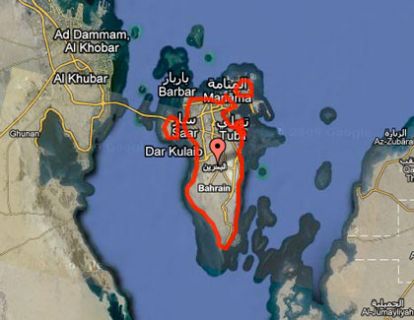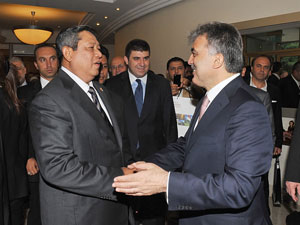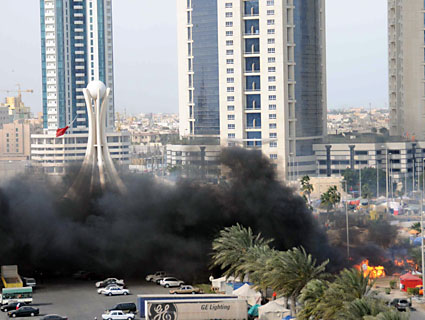
<a href="http://maps.google.com/maps?q=bahrain&oe=utf-8&client=firefox-a&ie=UTF8&hl=en&hq=&hnear=Bahrain&z=9">Google Maps</a>
![]() This story first appeared on the TomDispatch website.
This story first appeared on the TomDispatch website.
The men walking down the street looked ordinary enough. Ordinary, at least, for these days of tumult and protest in the Middle East. They wore sneakers and jeans and long-sleeved T-shirts. Some waved the national flag. Many held their hands up high. Some flashed peace signs. A number were chanting, “Peaceful, peaceful.”
Up ahead, video footage shows, armored personnel carriers sat in the street waiting. In a deadly raid the previous day, security forces had cleared pro-democracy protesters from the Pearl Roundabout in Bahrain’s capital, Manama. This evening, the men were headed back to make their voices heard.
The unmistakable crack-crack-crack of gunfire then erupted, and most of the men scattered. Most, but not all. Video footage shows three who never made it off the blacktop. One in an aqua shirt and dark track pants was unmistakably shot in the head. In the time it takes for the camera to pan from his body to the armored vehicles and back, he’s visibly lost a large amount of blood.
Human Rights Watch would later report that Redha Bu Hameed died of a gunshot wound to the head.
That incident, which occurred on February 18th, was one of a series of violent actions by Bahrain’s security forces that left seven dead and more than 200 injured last month. Reports noted that peaceful protesters had been hit not only by rubber bullets and shotgun pellets, but—as in the case of Bu Hameed—by live rounds.
The bullet that took Bu Hameed’s life may have been paid for by US taxpayers and given to the Bahrain Defense Force by the US military. The relationship represented by that bullet (or so many others like it) between Bahrain, a tiny country of mostly Shia Muslim citizens ruled by a Sunni king, and the Pentagon has recently proven more powerful than American democratic ideals, more powerful even than the president of the United States.
Just how American bullets make their way into Bahraini guns, into weapons used by troops suppressing pro-democracy protesters, opens a wider window into the shadowy relationships between the Pentagon and a number of autocratic states in the Arab world. Look closely and outlines emerge of the ways in which the Pentagon and those oil-rich nations have pressured the White House to help subvert the popular democratic will sweeping across the greater Middle East.
Bullets and Blackhawks
A TomDispatch analysis of Defense Department documents indicates that, since the 1990s, the United States has transferred large quantities of military materiel, ranging from trucks and aircraft to machine-gun parts and millions of rounds of live ammunition, to Bahrain’s security forces.
According to data from the Defense Security Cooperation Agency, the branch of the government that coordinates sales and transfers of military equipment to allies, the US has sent Bahrain dozens of “excess” American tanks, armored personnel carriers, and helicopter gunships. The US has also given the Bahrain Defense Force thousands of .38 caliber pistols and millions of rounds of ammunition, from large-caliber cannon shells to bullets for handguns. To take one example, the US supplied Bahrain with enough .50 caliber rounds—used in sniper rifles and machine guns—to kill every Bahraini in the kingdom four times over. The Defense Security Cooperation Agency did not respond to repeated requests for information and clarification.
In addition to all these gifts of weaponry, ammunition, and fighting vehicles, the Pentagon in coordination with the State Department oversaw Bahrain’s purchase of more than $386 million in defense items and services from 2007 to 2009, the last three years on record. These deals included the purchase of a wide range of items from vehicles to weapons systems. Just this past summer, to cite one example, the Pentagon announced a multimillion-dollar contract with Sikorsky Aircraft to customize nine Black Hawk helicopters for Bahrain’s Defense Force.
About Face
On February 14th, reacting to a growing protest movement with violence, Bahrain’s security forces killed one demonstrator and wounded 25 others. In the days of continued unrest that followed, reports reached the White House that Bahraini troops had fired on pro-democracy protesters from helicopters. (Bahraini officials responded that witnesses had mistaken a telephoto lens on a camera for a weapon.) Bahrain’s army also reportedly opened fire on ambulances that came to tend to the wounded and mourners who had dropped to their knees to pray.
“We call on restraint from the government,” Secretary of State Hillary Clinton said in the wake of Bahrain’s crackdown. “We urge a return to a process that will result in real, meaningful changes for the people there.” President Obama was even more forceful in remarks addressing state violence in Bahrain, Libya, and Yemen: “The United States condemns the use of violence by governments against peaceful protesters in those countries, and wherever else it may occur.”
 Word then emerged that, under the provisions of a law known as the Leahy Amendment, the administration was actively reviewing whether military aid to various units or branches of Bahrain’s security forces should be cut off due to human-rights violations. “There’s evidence now that abuses have occurred,” a senior congressional aide told the Wall Street Journal in response to video footage of police and military violence in Bahrain. “The question is specifically which units committed those abuses and whether or not any of our assistance was used by them.”
Word then emerged that, under the provisions of a law known as the Leahy Amendment, the administration was actively reviewing whether military aid to various units or branches of Bahrain’s security forces should be cut off due to human-rights violations. “There’s evidence now that abuses have occurred,” a senior congressional aide told the Wall Street Journal in response to video footage of police and military violence in Bahrain. “The question is specifically which units committed those abuses and whether or not any of our assistance was used by them.”
In the weeks since, Washington has markedly softened its tone. According to a recent report by Julian Barnes and Adam Entous in the Wall Street Journal, this resulted from a lobbying campaign directed at top officials at the Pentagon and the less powerful State Department by emissaries of Bahraini King Hamad bin Isa al-Khalifa and his allies in the Middle East. In the end, the Arab lobby ensured that, when it came to Bahrain, the White House wouldn’t support “regime change,” as in Egypt or Tunisia, but a strategy of theoretical future reform some diplomats are now calling “regime alteration.”
The six member states of the Gulf Cooperation Council include (in addition to Bahrain) Kuwait, Oman, Qatar, Saudi Arabia, and the United Arab Emirates, all of which have extensive ties to the Pentagon. The organization reportedly strong-armed the White House by playing on fears that Iran might benefit if Bahrain embraced democracy and that, as a result, the entire region might become destabilized in ways inimical to US power-projection policies. “Starting with Bahrain, the administration has moved a few notches toward emphasizing stability over majority rule,” according to a US official quoted by the Journal. “Everybody realized that Bahrain was just too important to fail.”
It’s an oddly familiar phrase, so close to “too big to fail,” last used before the government bailed out the giant insurance firm AIG and major financial firms like Citigroup after the global economic meltdown of 2008. Bahrain is, of course, a small island in the Persian Gulf, but it is also the home of the US Navy’s Fifth Fleet, which the Pentagon counts as a crucial asset in the region. It is widely considered a stand-in for neighboring Saudi Arabia, America’s gas station in the Gulf, and for the Washington, a nation much too important ever to fail.
The Pentagon’s relationship with the Gulf Cooperation Council countries has been cemented in several key ways seldom emphasized in American reporting on the region. Military aid is one key factor. Bahrain alone took home $20 million in US military assistance last year. In an allied area, there is the rarely discussed triangular marriage between defense contractors, the Gulf states, and the Pentagon. The six Gulf nations (along with regional partner Jordan) are set to spend $70 billion on weaponry and equipment this year, and as much as $80 billion per year by 2015. As the Pentagon looks for ways to shore up the financial viability of weapons makers in tough economic times, the deep pockets of the Gulf States have taken on special importance.
Beginning last October, the Pentagon started secretly lobbying financial analysts and large institutional investors, talking up weapons makers and other military contractors it buys from to bolster their long-term financial viability in the face of a possible future drop in Defense Department spending. The Gulf States represent another avenue toward the same goal. It’s often said that the Pentagon is a “monopsony,” the only buyer in town for its many giant contractors, but that isn’t entirely true.
The Pentagon is also the sole conduit through which its Arab partners in the Gulf can buy the most advanced weaponry on Earth. By acting as a go-between, the Pentagon can ensure that the weapons manufacturers it relies on will be financially sound well into the future. A $60 billion deal with Saudi Arabia this past fall, for example, ensured that Boeing, Lockheed-Martin, and other mega-defense contractors would remain healthy and profitable even if Pentagon spending goes slack or begins to shrink in the years to come. Pentagon reliance on Gulf money, however, has a price. It couldn’t have taken the Arab lobby long to explain how quickly their spending spree might come to an end if a cascade of revolutions suddenly turned the region democratic.
An even more significant aspect of the relationship between the Gulf states and the Department of Defense is the Pentagon’s shadowy archipelago of bases across the Middle East. While the Pentagon hides or downplays the existence of many of them, and while Gulf countries often conceal their existence from their own populations as much as possible, the US military maintains sites in Saudi Arabia, the United Arab Emirates, Oman, Qatar, Kuwait, and of course Bahrain—homeport for the Fifth Fleet, whose 30 ships, including two aircraft carriers, patrol the Persian Gulf, the Arabian Sea, and the Red Sea.
Doughnuts Not Democracy
Last week, peaceful protesters aligned against Bahrain’s monarchy gathered outside the US embassy in Manama carrying signs reading “Stop Supporting Dictators,” “Give Me Liberty or Give Me Death,” and “The People Want Democracy.” Many of them were women.
Ludovic Hood, a US embassy official, reportedly brought a box of doughnuts out to the protesters. “These sweets are a good gesture, but we hope it is translated into practical actions,” said Mohammed Hassan, who wore the white turban of a cleric. Zeinab al-Khawaja, a protest leader, told Al Jazeera that she hoped the US wouldn’t be drawn into Bahrain’s uprising. “We want America not to get involved, we can overthrow this regime,” she said.
The United States is, however, already deeply involved. To one side it’s given a box of doughnuts; to the other, helicopter gunships, armored personnel carriers, and millions of bullets—equipment that played a significant role in the recent violent crackdowns.
In the midst of the violence, Human Rights Watch called upon the United States and other international donors to immediately suspend military assistance to Bahrain. The British government announced that it had begun a review of its military exports, while France suspended exports of any military equipment to the kingdom. Though the Obama administration, too, has begun a review, money talks as loudly in foreign policy as it does in domestic politics. The lobbying campaign by the Pentagon and its Middle Eastern partners is likely to sideline any serious move toward an arms export cut-off, leaving the US once again in familiar territory—supporting an anti-democratic ruler against his people.
“Without revisiting all the events over the last three weeks, I think history will end up recording that at every juncture in the situation in Egypt that we were on the right side of history,” President Obama explained after the fall of Egyptian strongman Hosni Mubarak—an overstatement, to say the least, given the administration’s mixed messages until Mubarak’s departure was a fait accompli. But when it comes to Bahrain, even such half-hearted support for change seems increasingly out of bounds.
Last year, the US Navy and the government of Bahrain hosted a groundbreaking ceremony for a construction project slated to develop 70 acres of prime waterfront property in Manama. Scheduled for completion in 2015, the complex is slated to include new port facilities, barracks for troops, administrative buildings, a dining facility, and a recreation center, among other amenities, at a price tag of $580 million. “The investment in the waterfront construction project will provide a better quality of life for our Sailors and coalition partners, well into the future,” said Lieutenant Commander Keith Benson of the Navy’s Bahrain contingent at the time. “This project signifies a continuing relationship and the trust, friendship and camaraderie that exists between the US and Bahraini naval forces.”
As it happens, that type of “camaraderie” seems to be more powerful than the President of the United States’ commitment to support peaceful, democratic change in the oil-rich region. After Mubarak’s ouster, Obama noted that “it was the moral force of nonviolence, not terrorism, not mindless killing, but nonviolence, moral force, that bent the arc of history toward justice once more.” The Pentagon, according to the Wall Street Journal, has joined the effort to bend the arc of history in a different direction—against Bahrain’s pro-democracy protesters. Its cozy relationships with arms dealers and autocratic Arab states, cemented by big defense contracts and shadowy military bases, explain why.
White House officials claim that their support for Bahrain’s monarchy isn’t unconditional and that they expect rapid progress on real reforms. What that means, however, is evidently up to the Pentagon. It’s notable that late last week one top US official traveled to Bahrain. He wasn’t a diplomat. And he didn’t meet with the opposition. (Not even for a doughnut-drop photo op.) Secretary of Defense Robert Gates arrived for talks with King Hamad bin Isa al-Khalifa and Crown Prince Salman bin Hamad al-Khalifa to convey, said Pentagon Press Secretary Geoff Morrell, “reassurance of our support.”
“I’m convinced that they both are serious about real reform and about moving forward,” Gates said afterward. At the same time, he raised the specter of Iran. While granting that the regime there had yet to foment protests across the region, Gates asserted, “there is clear evidence that as the process is protracted—particularly in Bahrain—that the Iranians are looking for ways to exploit it and create problems.”
The Secretary of Defense expressed sympathy for Bahrain’s rulers being “between a rock and hard place” and other officials have asserted that the aspirations of the pro-democracy protesters in the street were inhibiting substantive talks with more moderate opposition groups. “I think what the government needs is for everybody to take a deep breath and provide a little space for this dialogue to go forward,” he said. In the end, he told reporters, US prospects for continued military basing in Bahrain were solid. “I don’t see any evidence that our presence will be affected in the near- or middle-term,” Gates added.
In the immediate wake of Gates’ visit, the Gulf Cooperation Council has conspicuously sent a contingent of Saudi troops into Bahrain to help put down the protests. Cowed by the Pentagon and its partners in the Arab lobby, the Obama administration has seemingly cast its lot with Bahrain’s anti-democratic forces and left little ambiguity as to which side of history it’s actually on.
Nick Turse is an historian, essayist, investigative journalist, the associate editor of TomDispatch.com, and currently a fellow at Harvard University’s Radcliffe Institute. His latest book is The Case for Withdrawal from Afghanistan (Verso Books). He is also the author of The Complex: How the Military Invades Our Everyday Lives. You can follow him on Twitter @NickTurse, on Tumblr, and on Facebook. His website is NickTurse.com.










